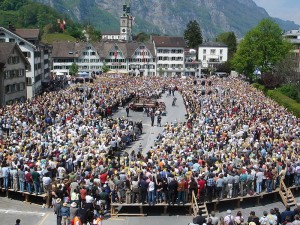A professionally-shot and edited video of Cobden Centre Senior Fellow Jesús Huerta de Soto’s recent scintillating and inspirational speech at the LSE, delivered on the 28th of October, 2010, will be available soon at the Cobden Centre. In the meantime, Brian Micklethwait and I thought that we would release an audio podcast preview of this speech on Cobden Centre Radio, to share and spread the message of this incredible Promethean bearer of the economic torch of Ludwig von Mises, himself a Promethean bearer of the torch of the University of Salamanca, led by the Spanish theologians, rooted in the scholastic work of Francisco de Vitoria, brought to us through the ages and linking us through to Thomas Aquinas and Aristotle.
Look forward to the video; in the meantime, here is the complete speech as recorded via the technical wizardry of Brian with his Zoom H2 Handy recorder and some guerilla recording techniques as employed in the Sheikh Zayed theatre, at the London School of Economics, for the 2010 Hayek Memorial Lecture, as sponsored by Toby Baxendale, our Cobden Centre Chairman; Professor Huerta de Soto is introduced by Professor Tim Besley of the LSE:
The full text of the speech can be found here.
There is an alternative MP3 recording of the speech, provided by the LSE, which you can listen to here.
[By the way, listen out for the spontaneous break out of applause towards the end of the lecture when Huerta de Soto calls for a ‘Bank of Amsterdam’-style return to a 100% monetary reserve standard based upon gold.]







I was there! Great event. De Soto has a strong Spanish accent but it was fine. The message was still clear and he’s clearly a very enthusiastic and friendly person.
Good you could be there, John, and I’m glad you weren’t locked out like some unfortunate others. If you haven’t read it already, it’s now time to read the Professor’s Magnum Opus, freely available as a PDF:
Money, Bank Credit, and Economic Cycles
As simple as it gets….logical and clear speech.
Great speech (I read the text via Mises.org) in general and a heroic effort to briefly explain the Austrian view of the business cycle. My only criticism would be that it could have described how the other two major schools of macroeconomics differ from the Austrian analysis – rather than simply how central bankers/press/politicians have interpreted the crisis.
I did feel that he was a little too sanguine about the likely outcome. There are strong indications that the US (and Bank of England) are keen to inflate their way ‘out’ by running effectively negative interest rates and by deliberate expansion of the money supply. Quite what the next economic cycle will look like is not my place to say but it does seem that the conditions for another cycle of malinvestment via the process Prof de Soto describes are in the process of being laid as he speaks!
The policy prescriptions are ambitious but I see the real chances of them being fulfilled as close to zero. Despite fiscal contractions, on the monetary side quite the reverse is being done and the outcome seems to be greater banking regulation and not a move towards sound money.
I was slightly surprised to see a gold standard advocated rather than a denationalisation approach – isn’t that exactly what Hayek advocated? We’ve seen how, in an emergency, the gold standard will be abandoned and ultimately it provides no real checks on monetary expansion (even overlooking its other problems, or the problems inherent in any commodity currency).
The speech will be even better when you get to see the video. The speech itself goes over an hour, as it is. Explaining the two other schools (I presume you mean Keynesian and Monetarist) would have added on another 2 hours, at least, to be dispatched properly. As to the policy prescriptions, they may be ambitious, but he is telling it like it is. Let’s imagine that he’s telling a fat 25 stone smoker how to climb Everest. He can tell him the nice ‘politically correct’ way, “eat one less pork pie a week”, “only smoke 30 cigarettes a day instead of 40”, and “do a little light walking for half an hour each day to reach your peak fitness level”, and that’s all probably possible for the fatster. It’s still not going to get the fat lump to the top of Everest though, is it (unless he flies in Ben Bernanke’s helicopter, of course). All Huerta de Soto is doing is saying “stop smoking completely, to deal with the lack of oxygen; get down to 1500 calories a day, for six months, to get your weight down sufficiently to survive the climb with the backpack; and you’ve got to be be able to run 10 miles in 2 hours, as a minimum, to stand any chance of being fit enough to do the job, so get running.” Yes, it is an ambitious programme for our fatster, but if he wants to climb Everest, then that’s what he’s going to have to do. In the meantime, if he won’t follow the advice, then he can dream about planting the flag at the summit, but the likelihood is he’s going to sit there for 20 years festering, just like the Japanese have with their Keynesian ‘solution’ to their economic problems from the late 1980s. The world may not want to hear the truth, but I don’t think that precludes anyone from saying what they believe the true path to be in the first place. And it’s remarkable what can happen when enough people keep hearing the truth, and seeing men and women bold enough to proclaim the truth who never give in to evil, and can somehow get over all of that government programming that government education indoctrinates us all with, that government is always good in everything that it does. Besides, the world power elites can do what they like with regulation, including the introduction of a global fiat currency and global currency and price controls, but it’s not going to do them any good and will keep making things worse. The fiat currency fractional reserve party is over. Yes, it lasted nearly 40 years, from when Nixon finally shredded the last tatters of the gold standard brought about by Peel’s 1844 act, but it really is over. The Fed and all the other central banks are out of bullets. Until we follow the Austrian path, either by deciding to do it or by being forced into it through circumstance, we are going to remain stuck in a Japanese-style limbo, at best, for many years to come. I suggest you wait for the video, where the Professor answers some similar questions to yours on the gold question, after the speech finished. Essentially, going on memory, he said a proper free market gold standard only works when it is based on 100% reserves, manipulative central banks are abolished, and money is completely privatised. As you say, if we leave a gold standard in the hands of government, administered by fractional reserve government central banks, and still nationalised, we will only get again what we’ve already had, which is a slow abandonment of the standard, as we already witnessed from 1913 through to 1971, mostly driven by the instigation of state-led military and welfare wars. The solution is honest hard money and entrepreneurialism fed by free markets and genuine capital savings. In the long run, this is what we will achieve if we just keep pushing the ideas.
FYI The gold standard did not begin in 1844. Britain was on the gold standard for a century before that. The transition to the gold standard was made by Issac Newton when he was master of the mint in 1717.
100% reserves of gold to back both bank notes and demand deposits produces an extremely stable M0 money supply. If that is the sole circulating medium of exchange, the QTM leads me to expect quite rapid episodes of price inflation and deflation as the population’s propensities to produce, consume, or hoard ebbs and flows (modulating the “velocity of money” coefficient). Such changes make business calculation much harder and present an unmet human need for stability that offers an entrepreneurial opportunity.
The higher purpose of an “M1 money supply” is to inflate and deflate in sync with the level of basic economic activity so as to dampen large swings in price levels and to stabilize discount and interest rates. A market-based M1 money has been known to exist and to provide the desired flexibility. Such M1 money needs to mature into M0 money on a tight schedule, so that the supply of M1 shrinks and must be continuously renewed by beginning fresh economic activity. M1 creation cannot be centralized; it must be rooted in economic activity itself: the placing and filling of orders for goods and services.
This is not a policy argument – it is an argument about the origins of money in economic exchange. How does one arrange to dig up and refine that first ounce of gold? Assuming a division of this labor among many actors, something like short term credit, or real bills, must circulate until the first unit of hard M0 can be delivered. These logically first steps should not be labelled as the economic Original Sin of having a soft currency. Neither should this creation myth require a Prime Lender. The free market can (and did) do this at least once, and it will find that ideal state again.